Part I – The Arrival
[Go to Part II. Go to Part III.]
“Seat’s taken.”
The now-trite phrase was hurled at me matter-of-factly as the speaker covered the seat with her hand.
I was a bit caught off guard. Was this a joke or should I be offended?
I felt a bit like a young Forest Gump.
Well, except that I was sweating profusely and 30 years old.
As it turns out, the seat actually was taken. The beautiful Spanish lady of roughly 40 wasn’t referring to the popularized movie quote, nor was she intending to affront; she was merely being informative. Imagine that.
Wiping my forehead and rubbing my eyes, I continued towards the back in search of my seat as the bus engine became audible.
It was just after 9AM on a particularly hot July morning in the northern part of Madrid. Though summers in the landlocked capital city are typically brutal, you are usually given a reasonably cool morning until at least 10AM. But such was not the case on that day. The temperature had already eclipsed 30 degrees Celsius (~86 F) by sunrise.
Now, as man of generally average sweat yield, the mere early-morning heat would not produce the profundity of “salty rain” that I’ve referenced. That was the result of the rushed scene just previous to my tardy arrival.
You see, that morning, I had woken up a tad later than intended – possibly a side-effect of the later-than-average final evening in Madrid the night prior. Plus, I had not exactly researched the departure point relative to my hostel so I had virtually zero clue where I was going.
Late and clueless is not a great mixture for a tired and hungover foreigner.
By the time I had figured out the directions and had summited to the street level of the Nuevos Ministerios subway stop, I was already being called non-stop by the group director wondering where the “H” I was. I decided to make a run for it.
No doubt an ill-advised sprint given the oppressive heat, but a lot more so given my bulky cargo: a bright orange, 20LB, back-packer-pack on my back (say that 5 times fast), a tiny tandem day-pack bouncing about my chest, and a ‘hey-just-in-case-you-are-wondering-I-am-definitely-a-foreigner’ fedora on my keppy (chill guys, that’s Yiddish for ‘head.’ You guys are gross).
And now, after showing up approximately 15 minutes late and sweating profusely from under my obviously cheap and fairly stupid looking hat, my sitting prospects were being snubbed left and right.
And this wasn’t your typical, homogenous snubbing, but a snubbing from members of like 12 different countries. Effectively the whole world standing up against me in a united front like I represented some sort of existential threat to human proliferation.
Good first impression: check.
Just short of having a mental breakdown, I was able to secure an empty row on the right side of the bus towards the back. I unhooked my straps, tossed my miny-pack onto the aisle seat, and sat down next to the window with a gasp of relief.
I sat and thought about my time in Madrid and what I was getting myself into. As the bus pulled away, I turned towards the rear window to watch the last few minutes of the city landscape fade away.
And after about 10 minutes, the city was gone, and we were into the hills.
Next stop, La Alberca, Salamanca.
* * *
THE PROGRAM, Diverbo – Pueblo Ingles
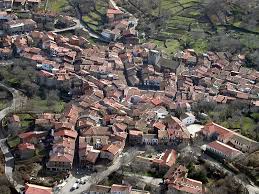
From: http://www.albereka.com/assets/images/content/alberca-6.jpg
Ok so what is this bus, and what does it do?
The bus I had just boarded was the shuttle to a program called Diverbo – Pueblo Ingles (or “PI” or “Diverbo”), a foreign language immersion program designed to provide a people-centered and practical experience to compliment book-learning. In plain terms, taking language learning out of the classroom and into real life.
The program is located in La Alberca, a small town nestled in the hills of a Spanish province called Salamanca. The bus ride from Madrid was to be westward about 3-4 hours.
The other and more punctual passengers were the other 25 or so participants in the program. They consisted of two groups: (1) the English speaking volunteer “teachers” (the “Anglos”) and (2) the Spanish-native and English-learning “students” (the “Spaniards”). I place students and teachers in quotes as the lines of these roles steadily blurred as the week progressed.
The basic parameters of the program are as follows. Some 10-20 Anglos from around the world volunteer to ‘teach’ English to between 10-20 working-professional, Spaniards.
For the most part, the Spaniards are basically conversant in English, albeit at varying degrees of fluidity. However, either the Spaniards themselves, or, more typically, their employers, are interested in paying for this program to increase fluency and exposure to different English dialects as applied to various practical scenarios.
The English speakers do not need to be ‘teachers’ in the formal sense – English need not even be their first language (we had a couple from the Netherlands). The requirements are much more to do with English fluency and a somewhat extroverted personality.
The two groups are then thrown into this beautifully crafted and time-tested program built specifically to facilitate a teaching and learning experience.
The result is quite profound, even placing language learning aside.
* * *
After about 20 minutes of sitting in my seat, contemplating my life, and snapping into a slim Jim, I decided that I hadn’t sufficiently bothered this group to my full potential.
I have an extreme issue with that tense feeling that pervades a group unfamiliar with each other. Like the one that develops in the elevator where everyone wants to talk but they just don’t feel comfortable starting. In these situations, I can usually muster up the courage to break the ice.
So, I got up and proceeded to systematically annoy the hell out of each person on that bus for about five to ten minutes each; lacking only the heat lamp and a terrible looking suit to complete the full-on interrogation scene.
About four hours later, with most of the bus probably pining to escape my grasp, we all looked around and found ourselves surrounded by nothing but bright sun, golden-brown rock and tall, green trees. We came around a corner, started a steep descent, and the bus came to a halt.
I walked off the bus, I breathed in the fresh mountain air, and exhaled. WE’RE THERE!
I grabbed my orange satchels (satchi?) and headed down the steep roadway to the Doña Teresa Hotel, our lodging for the duration of the program.
Now for a hostel / Airbnb hopping bloke, the sight of any semblance of a hotel would be a welcomed one – but this hotel had very special appeal.
Allow me to explain…
* * *
THE HOTEL, Doña Teresa
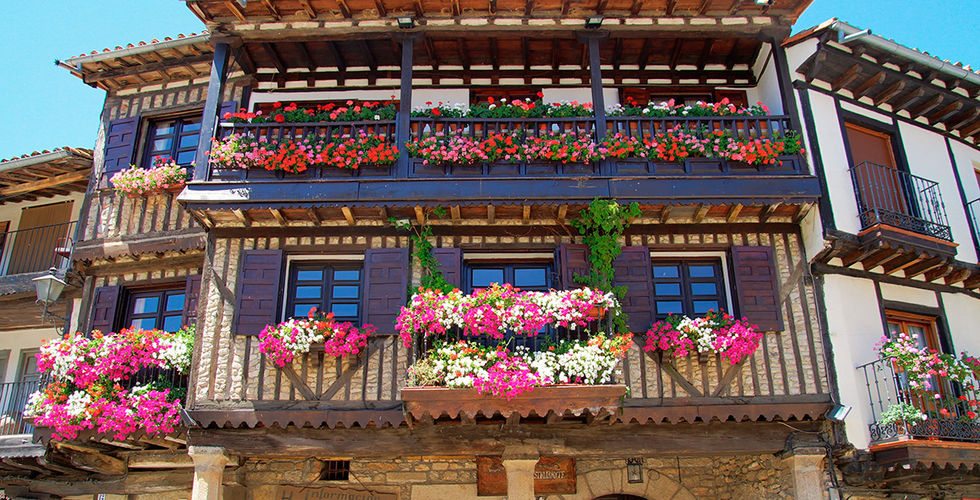
Stolen from here: http://www.voyage-prive.es/ppl/viajes-espana-salamanca-hotel-dona-teresa/35332
The Doña Teresa Hotel is one of those very classic and elegant buildings that somehow appears to be ancient and modern at the same time. Sort of like what I would imagine it would feel like to stand in front of the Dos Equis, “Most Interesting Man in the World” – except – you know — a building.
The hotel façade was somewhat storybook and medieval – chocolate wooden vertical planks filled in by cream-colored, stone walls and flower-tapered windows. Basically, it was the real version on which every piece of West Elm or Etsy furniture is based.
Out front, there is a patio with five or six umbrella-shaded tables – perfect for the deceptively hot, mountain sun. If you can manage to wake in the early morning hours, you can see the sunrise over the mountains from the eastern corner.
Below the patio is a tiny stream dotted with stones constantly massaged by a faint current. During the quieter hours, I would come here to simply look and listen.
Aside from the deck, little tables of two and four are almost hidden in corners of the lawn tucked under the breezing trees. Together with the deck, these places of refuge would provide the comfortable grounds for many hours of conversation and laughing and learning.
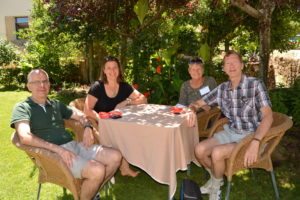
Group time under the trees
The inside walls were stone and cold, but somehow gave off a modern and warming appeal when coupled with the furniture and lighting and people. We all but felt we were in an old tale, if not for the huge group with name tags and the disillusioning wifi access.
The bedrooms are quaint, quiet and cool, with comfortable beds and, for the lucky, a private garden or window to the outside grounds.
The balance of the hotel consisted of the common areas and the dining hall – the places for conversation during meals or as a refuge from the heat. They were tastefully done with plenty of comfortable chairs, couches and tables – all ideal for conversing.
The dining hall was filled with six or seven white-clothed, six-top, tables. To the left were two tables highlighted by inward, beating rays of the always bright and clear, La Alberca sun. These were the best tables and I would try to steal a seat there whenever possible.
* * *
After snapping a few pics of the outside, we were all summoned into the lobby for a typically late Spanish lunch (~ 3PM). And as we piled inside, we were able to take in a quick glance of the rocky, yet cozy interior.
We would have to stay put there for about five to ten minutes as the previous week’s group was finishing their lunch and saying their goodbyes. We were held momentarily in the hotel bar / waiting room. There was no chance of not waiting there, that’s the name of the room.
Something struck me as interesting in that scene. One group was crying through their smiles, exchanging numbers and emails, and lingering just a bit before their departure. And then there was us – a group of eager but somewhat clueless bystanders, tired from travel, patience-less, and hungry.
And though most of us probably had an idea of what the other group was going through (this is the typical Jewish summer camp last breakfast scene), we couldn’t actually feel it or experience it. And I think that bit of distance allowed us to think ‘ucchh – we have to wait!?,’ instead of looking through a more empathetic viewpoint.
Anyway, the other group filed out. Their somber, bitter-sweet mood was starkly contrasted by our enthusiasm, nervous energy and overall not-knowing-what-to-expect-ed-ness. The staff then performed a very impressive turn-around on the white-clothed tables and place settings, and we filed in. Transition complete.
I made haste for one of the window seats. And after what would become the common wine-glass-chime and an announcement made by Ameilia, our New Zealand-born, program MC, the week had officially started.
I took my table with the Kiwi MC, a Texan, and a Spaniard, and we were greeted with perhaps three of the four nearest and dearest loves of Spanish culture — wine, bread and olive oil. The forth love, ham, or jamón, is present at nearly every meal in at least one course.
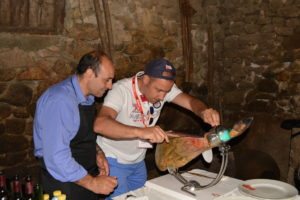
Oscar cutting the jamon later in the week
In my typical healthy / rabbit diet of carrots, wheat grass, twigs and pebbles, I rarely would eat these things for lunch, but I continued to hear the voices from the beginning of my trip urging me to “live in the moment” and “take in the culture” so I said yes to the wine and the bread and the oil (and the steak, potatoes and helado desert to follow).
Yikes.
As we broke the bread (and the ice), I engaged in my first “conversation” with a Spaniard. I was met with a blank stare and an empty smile – a sure-fire sign of non-comprehension.
Immediately, I started to get the sense of what the week would entail. A juggling of mixed personalities, intentions, blank stares, cultures, backgrounds and mispronunciations.
Even in this first meal, my preexisting communicative weaknesses surfaced rapidly — my speech was too fast, my words too complex or inaccurate, my listening too impatient and my energy too depleted. If I was going to make it through this week, be an effective volunteer, and take something out of this program, I was going to need to cure at least some, if not all, of these ailments, and fast.
Nothing brought these shortcomings to light more than the free-style structure of the meals. Ironically – or not ironically (I am not confident I actually know the definition of this word)—the meals were possibly the best opportunity to improve upon the various communication skills I was to acquire.
* * *
THE MEALS
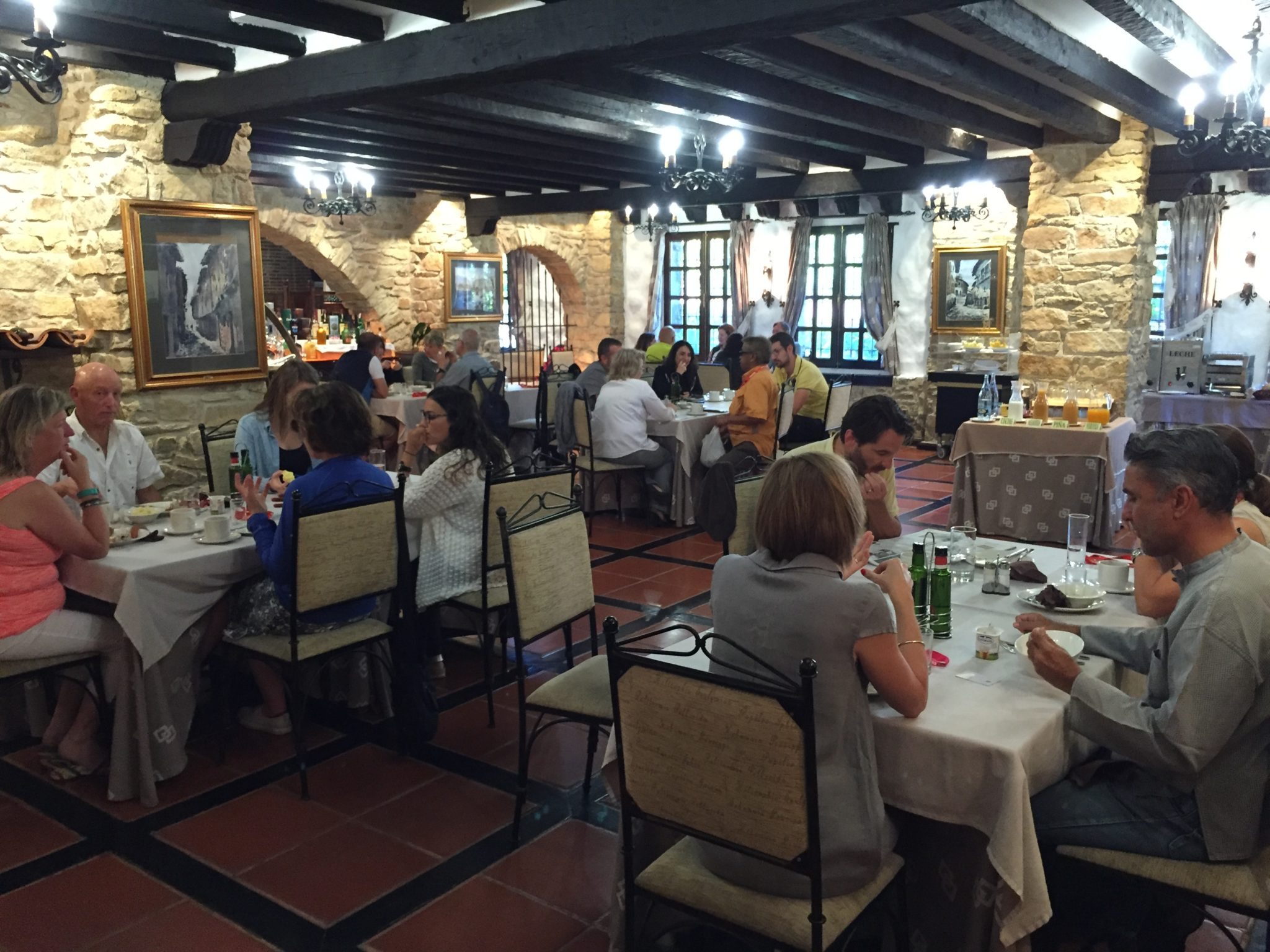
Nuestra Gente!
In America, hunger seems almost akin to a sickness. I am hungry and some fried, dopamine-reaction-causing, food is the cure. And that cure better come fast! Apparently this process is more about the ends of the meal than the means.
The Spanish, on the other hand, have traditionally viewed meals more like events and opportunities to visit with friends and family and to slowly enjoy the food and the wine and life. This is much more comparable to an American holiday or maybe a weekend brunch (less the terrible box-wine and mimosas).
In fact, it used to be typical for a Spaniard to leave work around 1PM and come back around 4:30PM or so, after a big long meal and a nice siesta (nap time). Unfortunately, this once widespread tradition is becoming less and less so in the big cities of Spain as they adopt more of a westernized approach to work and life.
On the bright side, this daily cadence is still alive and well in small country towns like La Alberca, and the Diverbo meals were designed specifically to hold onto that tradition.
Each meal consisted of at least three courses, starter, main and dessert, accompanied by three of those culinary loves mentioned above: bread, olive oil and wine. Prior to each meal we would select from menu of several options and then we would head to our tables.
We were able to choose any table we wanted, with the simple caveat that each table must consist of at least two Spaniards and two Anglos – ideally situated in alternating nationalities.
As I mentioned earlier, these meals provided a great setting for improved communication and organic and interesting conversation. I believe it was this open and light setting where students and teachers alike achieved much of their respective growth and captured much of Diverbo’s value.
With such a diverse group and dynamic atmosphere, the conversations alone, specifically during the six hours of mealtime each day, were more than worth the price of admission.
They ran the gamut from current events to ancient relics, to living in Aruba, the United Arab Emirates, Singapore, Australia, England, New Zealand, Alaska, and, of course, Spain, to what makes a good olive, to what distinguishes good ham, to being at a GOP convention, to the struggles of a teacher, to the intricacies of photography. And that was really just the first couple days.
By the last few days, if you were engaged and sincere enough, you might get someone to tell you stories about the things they love. At the moment, two particular conversations spring to mind.
One was with a particularly distinguished-looking and sun-kissed “Madrileño” of maybe 45 or 50 years. We were just enjoying our breakfast when he began to tell me about his business.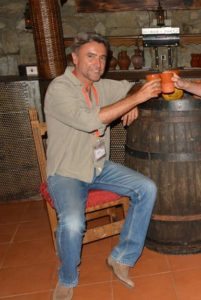
He had been an entrepreneur all his life – graphic design, digital advertising (I believe) but always in some way tied to his passion: photography. He started with the basic function of the current business, but then made a welcomed transition into how he came to be captivated by photographs. You could see his eyes light up as he went through the history, the way the camera works, the precision involved in getting just the right light, the artistry in capturing the right image.
What was interesting in this moment, is that he was not struggling to find the words in English. He was ever-elegant as his words effortlessly glided into descriptive sentences. Perhaps the speaker’s interest in the subject informs language fluidity? I do not know.
[Towards the very end of the trip, he presented to the group on the history of smiling for a photo and saying “cheese.”]
The second was with an extremely warm and wise Dutch woman. Along with her husband, she had participated in this program over ten times, I think, and together they assumed the roles of our group parents – probably the most adorable parents in the world. Though perhaps later in their lives, they had the energy, passion and youthful sprightliness of a couple of teenagers – all of which was maintained along with a certain gracefulness and kindness of inimitable expanse.
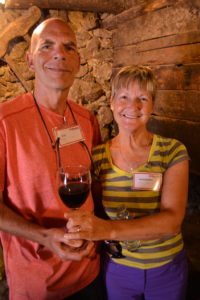
I mean, pretty damn ador, right?
I certainly am a bit of a talker, but whenever I was lucky enough to find myself in a conversation with this woman, I would try and say as little as possible with the exception of a leading question here and there. There was just an obvious sense that when she spoke, or when either of them spoke for that matter, you’d better listen.
This time, she began to tell the table the story of when she met her husband and a few of the twists and turns they experienced throughout their, so-far, enchanting lives.
She told us how they had met as teenagers. He had taken the fall for her in a detention scenario where he was required to write on the blackboard for a long time. It was then that she realized that she may want to hang on to this one.
And as she told us various stories from throughout their history – the meager and modest beginnings to a more comfortable life – one full of travel and living different places and owning different businesses and even writing different books – I couldn’t help but be amazed and inspired.
And you couldn’t help but be infected by her gentle voice and warm smile and bubbling enthusiasm. She constantly beamed rays of bright hope and certain optimism.
After that first lunch we were assigned our rooms for the week and then were free to participate in one of the more cherished Spanish traditions – SIESTA! I grabbed my room key, threw on my packs, and headed up to the second floor.
* * *
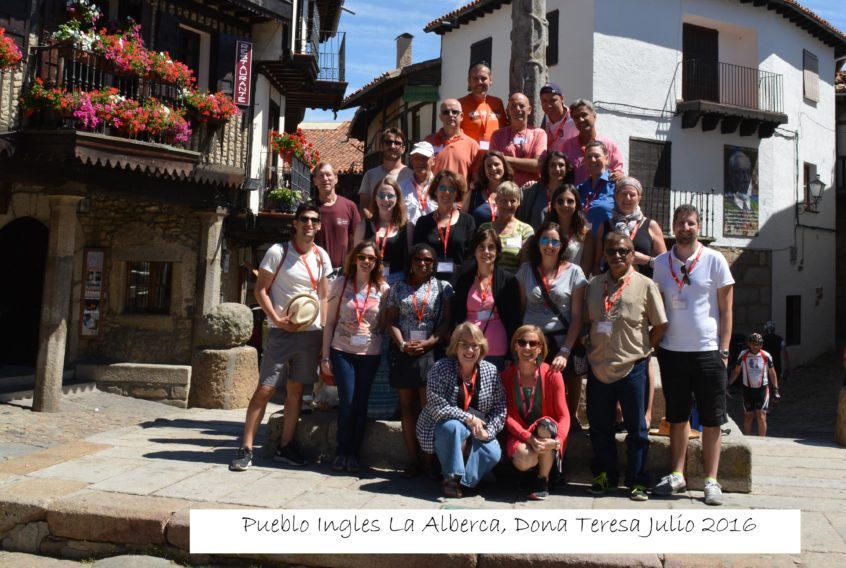


14 Comments on “Diverbo: Lessons on Listening (Part I)”
That was an excellently written article, it was very interesting and informative.
Your “group parents” are friends of mine and they are amazing people.
Thanks, Barb! Yes they are!
Wonderful, interesting, and amazing!! Please continue!!
Thanks, Marjorie. Part II tomorrow!
Nicely written! Eager to read more. Senorita Sampedro would be very proud… bow chicka wow wow
Thanks, WackyJuan!
One of the few times you were late…
It’s spelled: “tarde”
Regardless of how you want to word it, it was a selfish act.
No argument there.
Turning the page
nice.
The Mommy loves your blog! I felt like I was there with you! Loved meditations!,
Thanks, Mom.